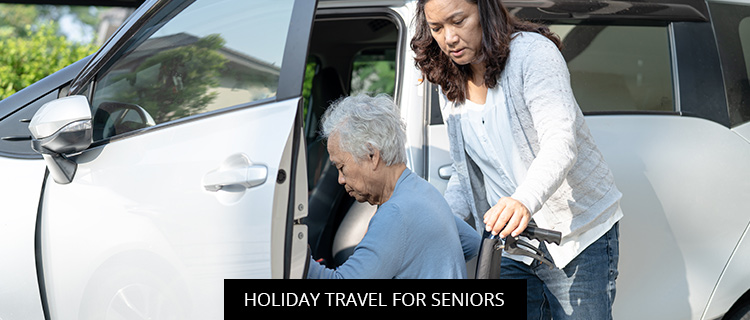Seniors And Healthy Travel

The New Year is here, which sometimes can bring in resolutions that include traveling. Associated with that is, flu season, and COVID-19, and it’s easy to see why some seniors suffer when deciding to travel.
According to a recent study, here are some of the biggest challenges for seniors traveling:
- Traveling Alone
- Disrupted Routine
- Missed Medications
- Unhealthy Diet
- Too Much Activity
As an Always Best Care franchise owner, you have probably already been contacted by adult parents and family caregivers, asking questions about how to keep their seniors safe and healthy while traveling. Here are just a few pieces of advice that you can offer your clients:
Travel Safety
Traveling can be hard on seniors. Recommend that your senior client visit their doctor before the travel is scheduled. A senior’s doctor can clear them for travel, offer tips to reduce stress, and recommend medications to ensure they stay healthy. They can also give tips on traveling with medications and when to take such medications during their travels. If the doctor prescribes medication specifically for travel, recommend that your senior or their family check to ensure there won’t be any unintended side effects with other meds.
Lastly, make sure there is enough time allotted for the senior to rest after traveling. Travel can be tiresome for anybody, but especially for seniors. Whether they travel by car, train, or plane, keep in mind that an older relative might want to rest upon arrival. Before engaging in more activity, make sure seniors take a nap or rest before more activities occur.
Here are a few more quick tips for your aging clients or their loved ones to consider:
- Ask for enough medication to cover time away. Talk to a doctor about how time zones might affect medication schedules.
- Bring copies of important documents like health insurance and emergency numbers.
- Give copies of travel itineraries to loved ones.
- Carry medications and essential items on the plane or in the car in case of emergency or disruptions to plans.
- Wear a medical ID if needed.
- Use hand sanitizer and wash hands to avoid germs.
- Ask for an escort or wheelchair to help navigate seniors in airports safely.
- Drink plenty of water to stay hydrated.
Changes to Routine
This point is most salient for seniors with dementia or Alzheimer’s, though any older adult can benefit.
When a senior has dementia or Alzheimer’s, preparation can mean the difference between peaceful moments and difficult behaviors. Prepare loved ones for holiday parties by sharing your plans a few weeks ahead of time. Talk about what they can expect and who else will be there. Use pictures to help them identify the faces they will see. If your senior client has specific dietary needs, suggest that family caregivers have those meals available.
Here are a few more quick tips to keep seniors with Alzheimer’s or dementia involved:
- Make healthy versions of food favorites.
- Encourage family members to ask seniors about their traditions and memories.
- Encourage family to help by listening, sympathizing.
- Encourage social activity, even if it’s using technology on platforms like Zoom.
Keeping Homes Safe
If an older relative leaves their home to spend time at a different house, suggest that their family double check the home for accessibility and safety. Remind your clients to keep an eye out for tripping hazards in the home. Also, point out that having seniors sleep on the first level of the home is preferred for easier access to the kitchen and bathroom. Nightlights are always a good idea, to help prevent stumbles in the dark.
Here are a few more quick tips to keep homes safe:
- Remove throw rugs. These may be decorative but often lack a rubberized backing to better grip the floor.
- Clean up piled clutter. This includes newspapers, loose clothes, and shoes.
- Create a more open environment. This will be easier to do if the senior doesn’t have mobility issues and doesn’t need a wheelchair. In the latter case, doorways should be at least 32” across to allow for access. Consider any tight corners before or after a doorway. These may restrict access and make maneuverability impossible.
- Avoid stretching extension cords across the floor.
- Encourage seniors to wear non-slip footwear when inside.
Best Wishes And Safe Travels From Always Best Care
From our family to yours, we would like to wish you the best in 2022.





